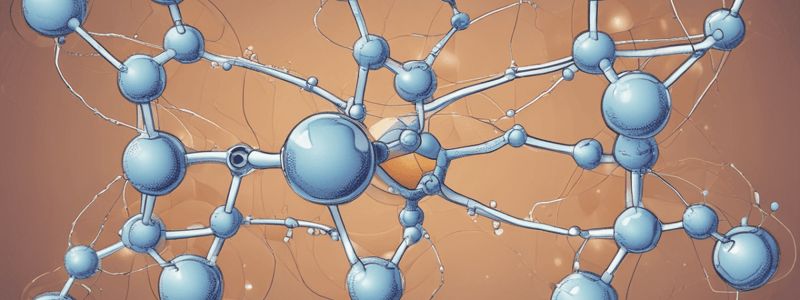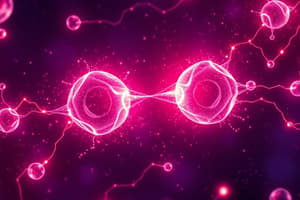Podcast
Questions and Answers
What is an ionic bond?
What is an ionic bond?
- The electrostatic force of attraction between oppositely charged ions (correct)
- The formation of ions with a neutral charge
- The unequal sharing of electrons between atoms
- The sharing of electrons between atoms
What is the main difference between ionic and covalent compounds in terms of their physical state at room temperature?
What is the main difference between ionic and covalent compounds in terms of their physical state at room temperature?
- Ionic compounds are liquids, while covalent compounds are solids
- Ionic compounds are solids, while covalent compounds are liquids or gases (correct)
- Ionic compounds are liquids or gases, while covalent compounds are solids
- Ionic compounds are gases, while covalent compounds are liquids
What is the term for electrons that are not involved in bonding?
What is the term for electrons that are not involved in bonding?
- Sigma bonds
- Bond pairs
- Pi bonds
- Lone pairs (correct)
What type of bond is formed by the end-on overlap of orbitals?
What type of bond is formed by the end-on overlap of orbitals?
What is the characteristic of covalent compounds in terms of their ability to conduct electricity?
What is the characteristic of covalent compounds in terms of their ability to conduct electricity?
What is the primary characteristic of a polar covalent bond?
What is the primary characteristic of a polar covalent bond?
What is the term for the number of bonds an atom of an element forms when it reacts?
What is the term for the number of bonds an atom of an element forms when it reacts?
Which of the following statements is true about the valency of an element?
Which of the following statements is true about the valency of an element?
What is the primary difference between σ and π bonds?
What is the primary difference between σ and π bonds?
Which of the following compounds would be expected to dissolve readily in water?
Which of the following compounds would be expected to dissolve readily in water?
What is the electronic arrangement of an atom that has reached its octet?
What is the electronic arrangement of an atom that has reached its octet?
Which of the following statements is true about ionic compounds?
Which of the following statements is true about ionic compounds?




